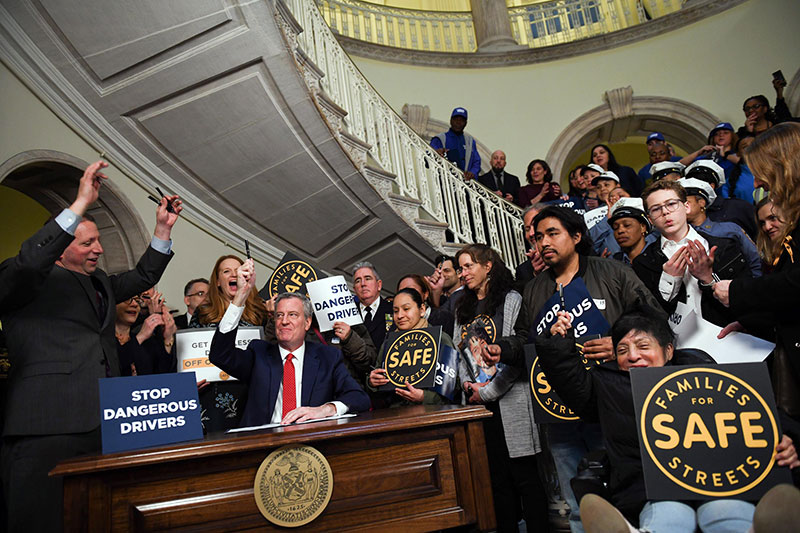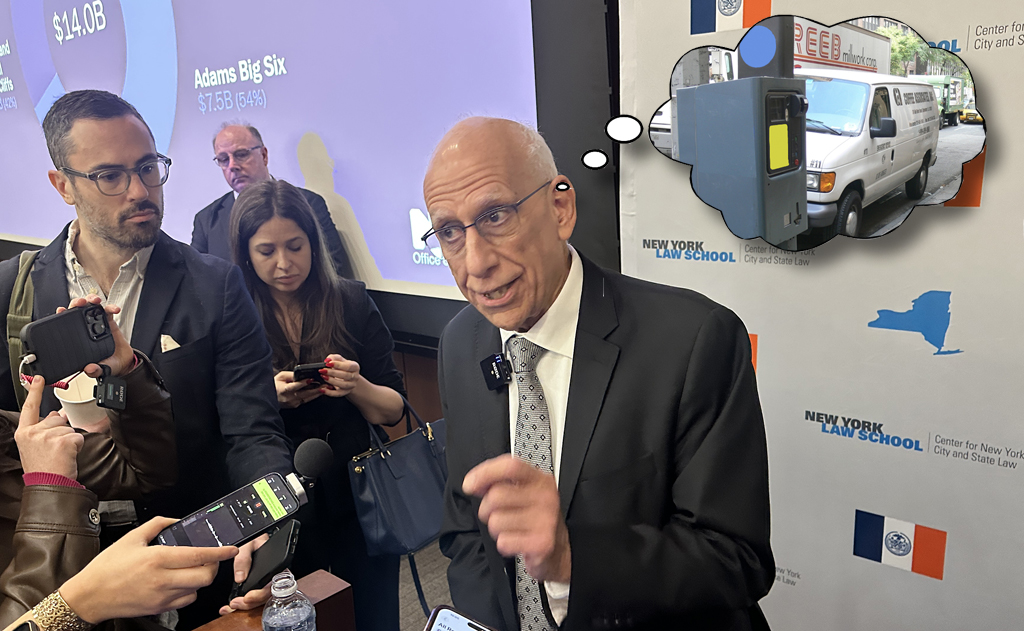Updated | For want of a tiny amount of money, a lot of reckless drivers are going to keep being reckless.
Mayor de Blasio has not put money in his budget proposal to fund the Dangerous Vehicle Abatement Program, an overwhelmingly popular piece of legislation signed in February that would require repeat speeding and red light offenders to take a driver-training course or have their wheels seized by the sheriff.
The expenditure of just $1.6 million is not listed as a "new need" in the mayor's proposed $89.5-billion budget for fiscal year 2021. Times are tough, of course, but the bill, which passed the council by a vote of 41-5, represents less than .0018 percent of the overall budget.
The bill's sponsor, Council Member Brad Lander, declined to criticize the mayor for the failure to fund the law, which Lander worked on for almost two years to surmount significant legal hurdles.
"The mayor has a lot on his mind right now, but this needs to get done," said Lander, who promised to ask Department of Transportation Commissioner Polly Trottenberg about the omission during budget hearings on Tuesday afternoon. "We have to put that money in the budget. These are budget negotiations, but it needs to be in there."
Even under tough budget circumstances, the failure of the mayor to allocate money for the program is stunning, given that just two-and-a-half months ago, he signed the bill and said it would put "all drivers on notice that if you behave recklessly behind the wheel, there will be real consequences."
At the same time, Trottenberg reminded everyone of the new law's urgency.
"We know that vehicles with the highest number of red light and speed camera violations are significantly more likely to be involved in serious crashes," she said. "This new law will help us change driver behavior so we can keep driving down traffic deaths and serious injuries.”
The law requires drivers who receive more than 15 camera-issued speeding tickets or five camera-issued red light tickets in any 12-month period to undergo additional driver education. The initial funding of $882,700 would have set up the classes and other program foundations. The costs would inevitably increase in coming years because drivers who do not follow through and take the class would have their cars towed by the county sheriff. But for the first six months of the program, the allocation amounts to lint in the bottom of the city's pockets.
"These are the basic resources needed to stand up the program," Lander said.
But is there even anything known as basic resources anymore? After the onset of the coronavirus crisis, Mayor de Blasio slashed more than $6 billion from his initial budget unveiled in January — including stiff cuts to vital programs such as summer youth employment, Vision Zero education, mental health treatment, fighting placard abuse, curbside composting pick-up, and even the "Billy Never Idles" anti-exhaust campaign (the Daily News's Anna Sanders reported on Monday).
Amy Cohen of Families for Safe Streets call it a fundamental safety issue.
"We cannot let the challenges of one epidemic mean we fail to address the preventable epidemic of traffic violence," Cohen told Streetsblog. "I stood by the mayor as he made a commitment to this life-saving program. We expect him to honor that promise and will pressure him until he does."
Lander said it was especially important to get the program up and running now, when speeding is its own epidemic, as Streetsblog has reported.
"The threshold of 15 speed-camera tickets sounded like a lot when the bill passed, but there are many drivers hitting it already," Lander said.
Indeed, one driver has accumulated 57 speed camera violations between March 10 and April 27 alone, according to the database-scraping bot, @howsmydrivingny.
From March 10, 2020 to April 27, 2020, #NY_JGT6812 received 57 camera violations:
— How's My Driving NY (@HowsMyDrivingNY) May 4, 2020
57 | Speed Safety Camera Violations
Another had 45 in an even shorter period:
From March 10, 2020 to April 20, 2020, #NY_JGT6812 received 45 camera violations:
— How's My Driving NY (@HowsMyDrivingNY) April 29, 2020
45 | Speed Safety Camera Violations
Many more have accumulated dozens of tickets since the coronavirus crisis started thinning out the highways of congestion.
Can the program's budget line be saved? Lander is confident, but he's also sure "it will take hard work."
"In this year's budget, everything is a challenge," he said. "Many council members have lost a lot they care about. Restoring things that got cut is hard, and funding things that are new is going to be hard.
"I encourage people who know how important this law is to let the mayor hear it," Lander said. "Our work is cut out for us."
City Hall did not respond to a request for comment.






